Interim Government Urge Politicians To Be Engaged in Reconstruction Process
Share on:
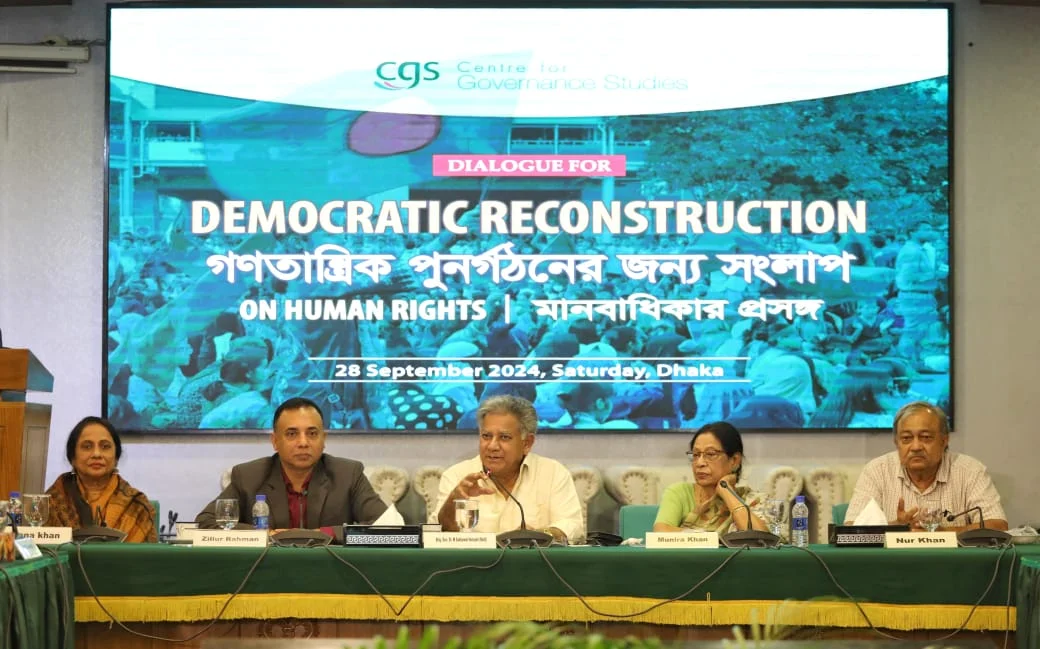
The Centre for Governance Studies (CGS) hosted a dialogue session on human rights at the Bangladesh Institute of International and Strategic Studies (BIISS) Auditorium on Saturday. The event brought together a diverse panel of experts, activists, and political leaders to address human rights in Bangladesh. Zillur Rahman, Executive Director of CGS, moderated the discussion.
Zillur Rahman opened the dialogue by emphasizing the long-standing challenges in human rights protection in Bangladesh, dating back to the country's independence. He remarked, "Human rights have always been neglected, and despite previous attempts at reforms, we have seen little progress. It is time for a comprehensive overhaul of our systems." He raised critical questions about the independence of the National Human Rights Commission (NHRC), the role of elite law enforcement units like the Rapid Action Battalion (RAB), and the involvement of international bodies in strengthening the country's human rights framework. "Reforms are not just necessary for today, but for the future generations to live in a society where justice and accountability are the norms," Rahman stated.
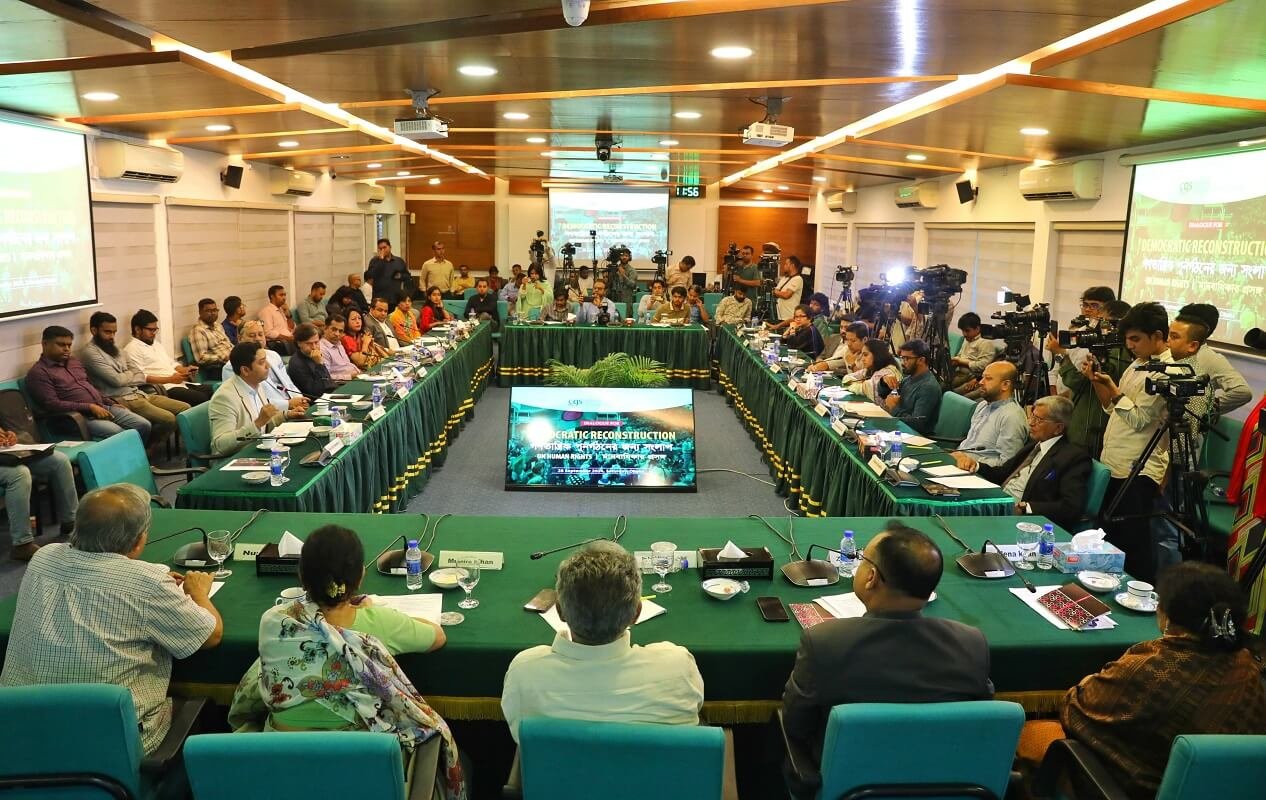
Brig. Gen. Dr. M Sakhawat Hossain, Advisor, Ministry of Textiles and Jute and Ministry of Shipping
Brig. Gen. Dr. M Shakhawat Hossain criticized the misuse of resources through excessive and unproductive government projects, particularly in the transport and infrastructure sectors. "The previous government did excessive projects to exhaust our resources. Out of the 24 land ports in Bangladesh,—hardly even cattle or goats use them," he said. He ensure that the interim government will provide comprehensive roadmap and urged that politicians be included in discussions. "The interim government must provide a clear roadmap. Six commissions have already been formed, and politicians need to be part of these conversations to ensure the reforms are sustainable," Dr. Hossain remarked. He also recommended forming a police commission to reform the police force and improve their conduct. Additionally, he suggested renaming the Ministry of Shipping to the Ministry of Ships and Ports for better alignment with its responsibilities. "Reform is crucial, not just in governance but also in the way we manage our institutions," he concluded.
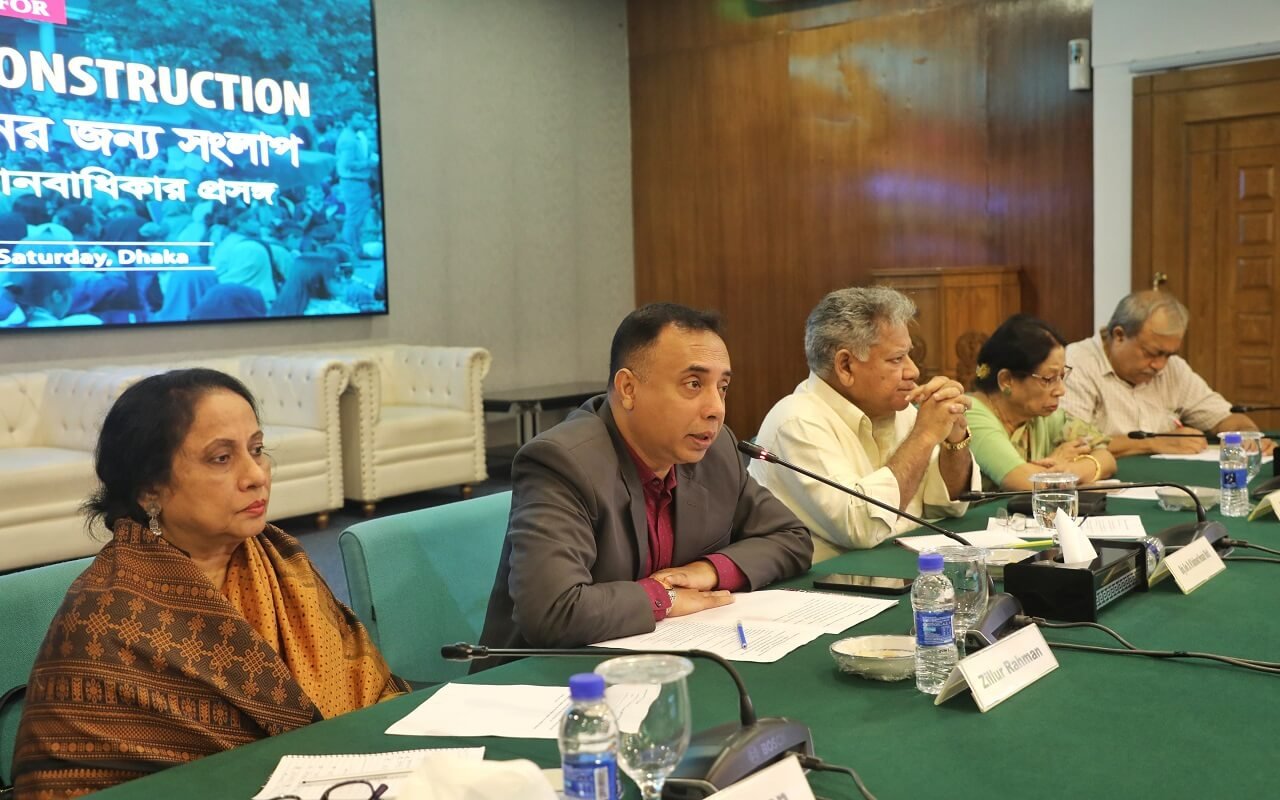
Munira Khan, Chair, CGS
Munira Khan highlighted the failures of the NHRC under previous governments, pointing out that it had not been transparent or effective in addressing human rights abuses. "The NHRC, as structured under previous regimes, failed to hold up transparency," she said. Munira emphasized the need for patience and collaboration with the current interim government. "We must ensure that we do not fall into the hands of authoritarianism again. For that, we need to give this government the necessary time to execute reforms," she urged. She stressed the importance of maintaining a positive attitude and giving the government the space to implement the necessary changes.
Nur Khan, Director, ASK
Nur Khan offered a long-term perspective on the human rights challenges facing Bangladesh, noting that the current situation is the culmination of 15 years of struggle. "The July-August movements were not isolated incidents but rather the peak of a 15-year-long struggle," he said. Khan urged the government to not only focus on recent human rights violations but to start discussions on violations dating back to 1972. "We must preserve sites of state abuse like torture cells and the 'Aynaghor' as historical evidence," he emphasized. Khan also called for immediate travel bans on government officials implicated in past human rights abuses to prevent them from fleeing the country. "Over the last 15 years, more than 6,000 extrajudicial killings have occurred in Bangladesh. Those responsible must be brought to justice," he stated. Khan concluded by warning that the government's failure to address these issues could result in further deterioration of the state.
Alena Khan, Lawyer, Supreme Court of Bangladesh
Alena Khan expressed concern about the feasibility of achieving justice for the July Revolution killings due to the weak First Information Reports (FIRs) being filed. "Even if convictions happen in lower courts due to public pressure, there is a high chance that the accused will be acquitted in the higher courts," she said. Khan advocated for the creation of a police commission to ensure transparency in investigations and accountability. She also pointed out the limitations of the NHRC, stating, "The NHRC can't do much because the laws governing it do not empower the commission sufficiently." Khan also called for the reform of laws governing the rights of marginalized communities, including third-gender individuals and Hindus, whose property rights are often ignored. She concluded by saying, "Without systemic reforms in the judiciary, police, and law enforcement agencies, no meaningful change can be achieved."
Advocate Subrata Chowdhury, Executive President, Gono Forum
Advocate Subrata Chowdhury reflected on the importance of involving students in the reconstruction of the state, drawing historical parallels to previous political movements in Bangladesh. "If we cannot use the energy and power of our students in rebuilding the state, then we, as a nation, have failed," he said. Chowdhury mentioned that after the 1969 uprising, there were high hopes, but the expectations were not fully realized. "We had similar hopes after the 1990 revolution, but again, the outcome was disappointing," he noted. He emphasized that for the state to truly change, the character of governance needs to be overhauled. "The involvement of the youth in reforming the state is crucial. If we don’t engage students in the reconstruction of the state, we fail as a nation," Chowdhury concluded.
Tauhid Siaam, Student Leader, Jahangirnagar University
Tauhid Siaam expressed frustration with the current political narrative that labels the government as one serving only students. "The government is not just for students; it is for everyone. We oppose the notion that students are the government's only concern." He criticized the NHRC as a "puppet" of past administrations, calling for genuine independence in the institution. He also highlighted the rampant politicization of civil services and law enforcement, noting, "Political interference in recruitment and promotions within key agencies has eroded public trust."
Ilra Dewan, Women’s Rights Activist
Elira Dewan focused on the human rights violations faced by the ethnic minorities in the Chittagong Hill Tracts (CHT), particularly the Bom community. "No government has truly addressed the human rights of the hill people," she lamented. Dewan criticized the NHRC for its lack of tangible action, stating that even though investigation teams visited CHT, no reports have been made public. "The Bom community continues to face cruel oppression, and justice remains elusive."
Barrister Ahsan Habib Bhuiyan, Lawyer, Supreme Court of Bangladesh
Ahsan Habib Bhuiyan highlighted the need for documentation of past human rights abuses, drawing parallels to South Africa's Truth and Reconciliation Commission. "Bangladesh must document all instances of enforced disappearances and extrajudicial killings that occurred under previous regimes," he asserted. Bhuiyan called for collaboration with international bodies to create a comprehensive documentation process and ensure that justice is served for victims of past atrocities.
Pallab Chakma, Executive Director, Kapaeeng Foundation
Pallab Chakma pointed out that human rights are often limited to specific groups or regions. He condemned the NHRC's inaction regarding the violence in CHT and the ongoing discrimination against ethnic minorities like the Santal community in Rajshahi. "Human rights must be a holistic concept; we cannot focus on just one segment of society while ignoring others. We know who the perpetrators are, but no one is held accountable."
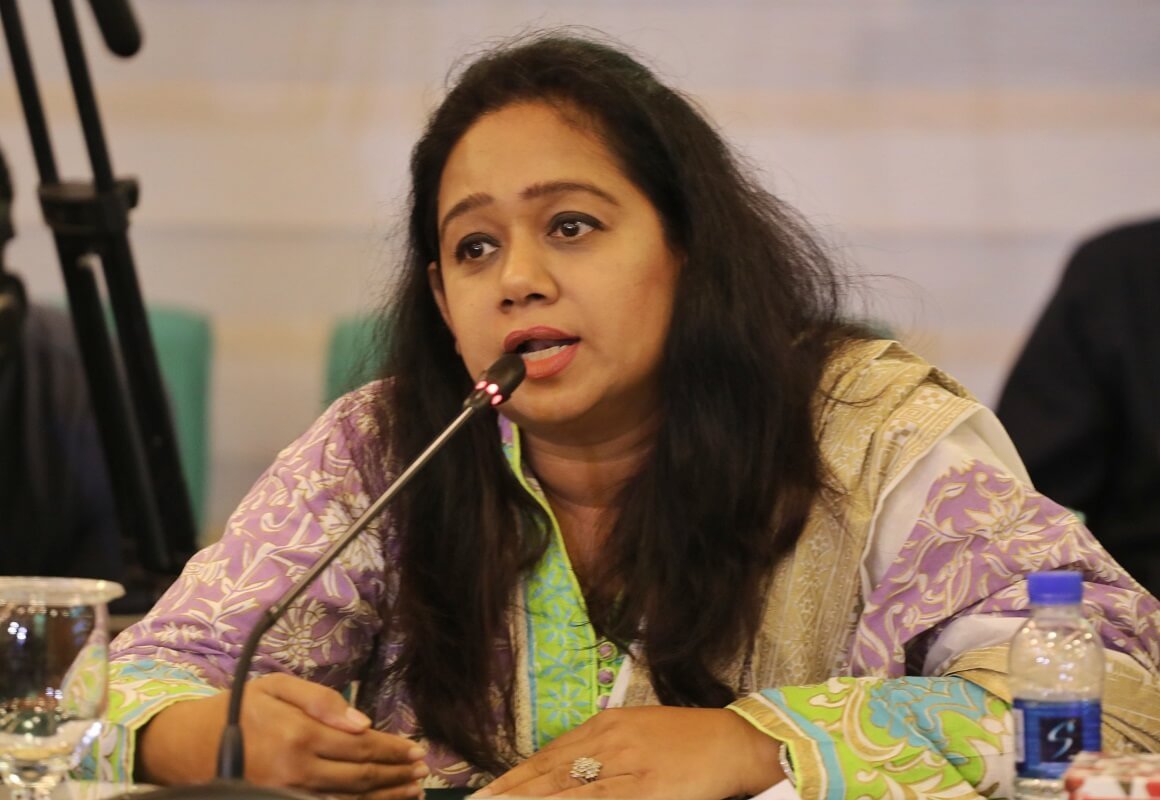
Sanjida Islam, Organizer, Mayer Daak
Sanjida Islam expressed relief that the current interim government allows discussions on enforced disappearances, a topic that was previously taboo. "The previous fascist regime denied the existence of such crimes. The NHRC did nothing but send letters to the home ministry," she said. She urged the current government to take concrete steps to address the issue of missing persons and criticized the lack of accountability for those involved in extrajudicial killings during the previous regime.
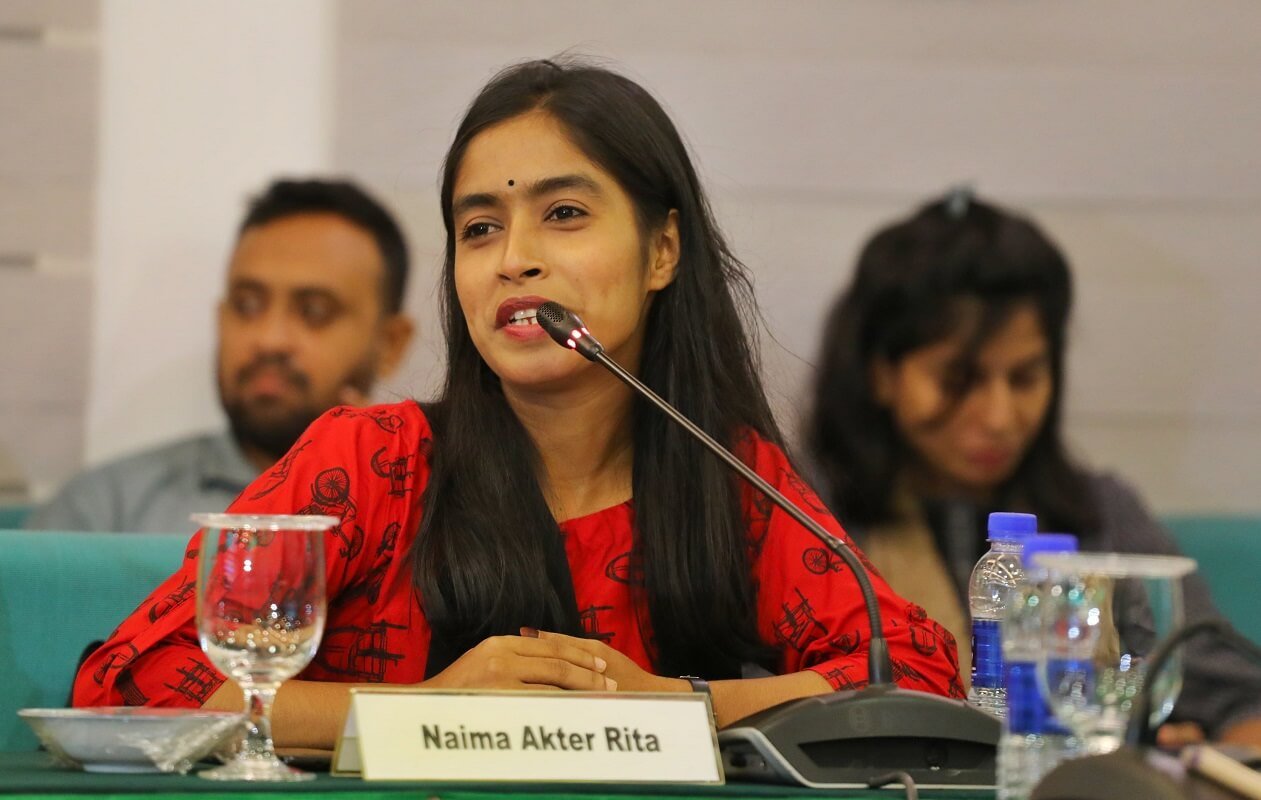
Naima Akter Rita, Student Leader, Jagannath University
Naima Akter Rita criticized the NHRC for being a "laughing stock" under past regimes. "The commission was never independent, and it failed to protect the rights of the people," she said. She also called for the inclusion of gender identity issues in educational curricula to foster a more inclusive society. "Transgender and sexual orientation issues need to be understood in schools so that we can build a society that respects diversity."
Joya Shikder, Trans Woman Activist
Joya Shikder raised the plight of the transgender community in Bangladesh, emphasizing the lack of social acceptance and legal recognition. "We have been ridiculed in the media and marginalized by society," Shikder said. She called for the passage of the long-pending transgender rights bill, stating, "We need legislation that protects our rights, similar to what other countries have done."
Shihab Uddin Khan, Barrister-at-Law
Shihab Uddin Khan criticized the NHRC as a "fraud" since its inception, pointing out its lack of independence and inability to act against government interference. He also called for the dissolution of RAB, labeling it an elite force that has been "weaponized to violate human rights." "We cannot talk about human rights without addressing the systematic abuse of power by elite forces," he remarked.
Dr. Shakhawat Hossain Sayantha, Secretary General, G9
Dr. Shakhawat Hossain shared his personal experience of wrongful imprisonment during the July Revolution, only gaining freedom after mass protests. He called for a government-led investigation into all human rights violations since 1972. "This government must be different. It must address all cases of enforced disappearances, extrajudicial killings, and wrongful detentions that have plagued this nation."
Ashraf Kaiser, Political Analyst
Ashraf Kaiser stressed that human rights in Bangladesh are applied selectively based on ethnicity, religion, and gender. "We discuss the abuse by RAB but stay silent about other agencies like DGFI. Every institution must be reformed to ensure true justice for all citizens," he urged. He also noted the importance of addressing minority rights in a comprehensive manner.
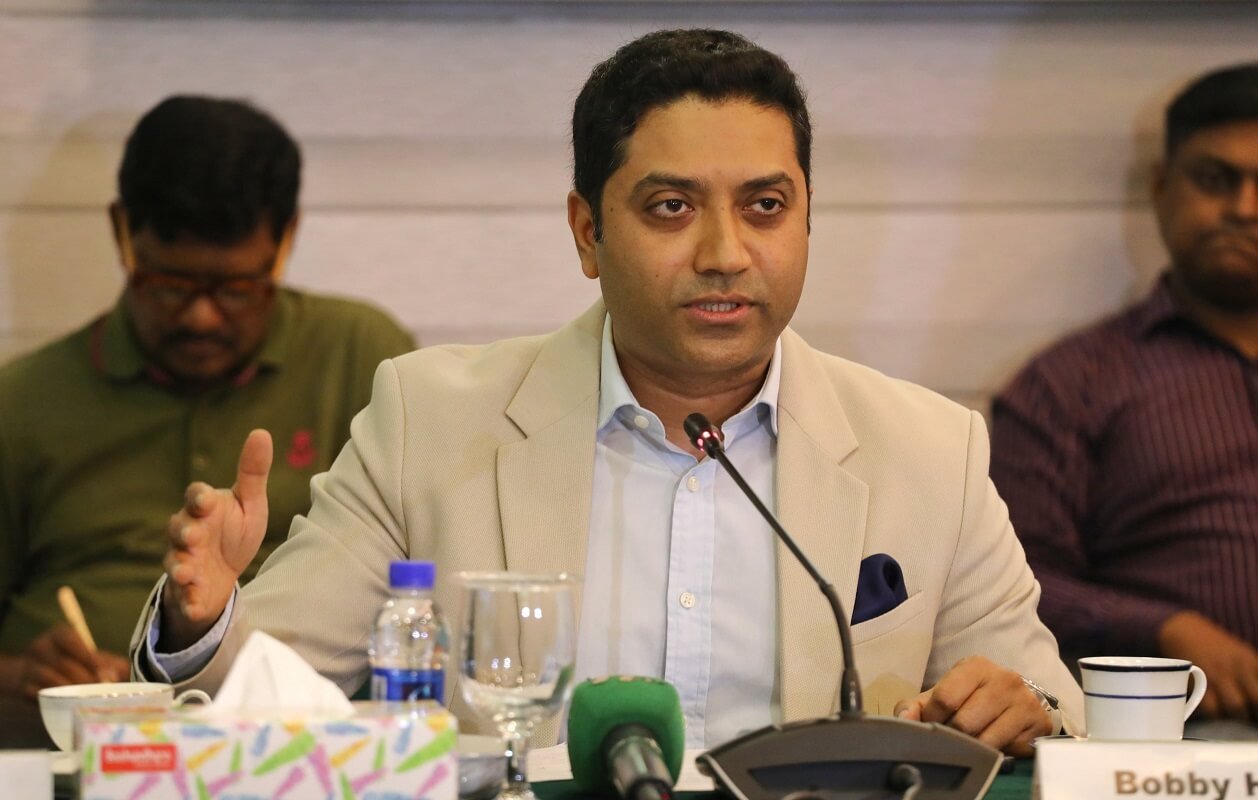
Bobby Hajjaj, Chairman, Nationalist Democratic Movement (NDM)
Bobby Hajjaj called for the immediate disbanding of RAB, stating that law enforcement should be the responsibility of the police, while defense and border security should be handled by the military. "RAB has been a tool for violating human rights for far too long. If our legal system worked as it should, we wouldn't even need this discussion."
Rashed Khan, General Secretary, Gono Odhikar Parishad
Rashed Khan expressed concerns about the new government's ability to maintain law and order, suggesting that without quick action, another 1/11-style political crisis could occur. "We need political parties to be included in the reform process. If the interim government fails, the opportunity for real reform will be lost."

